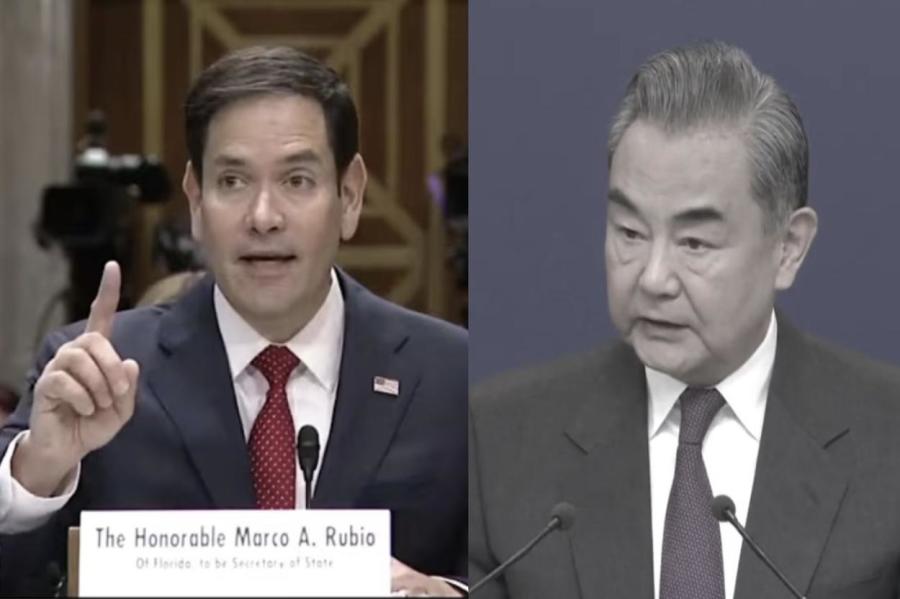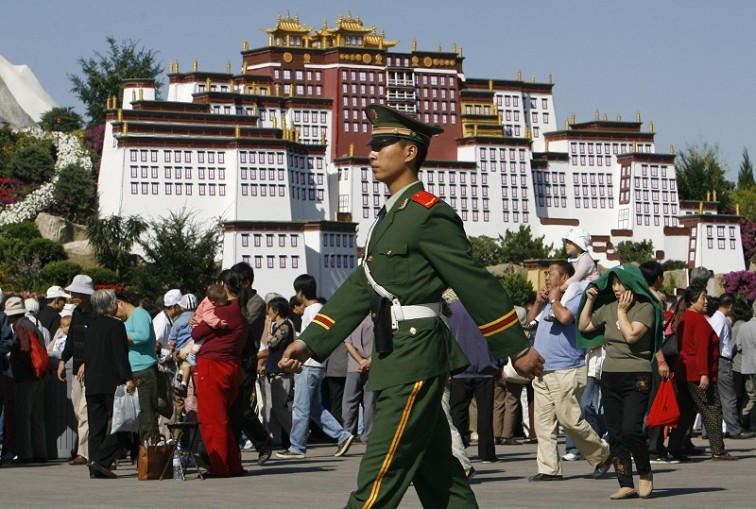Rubio (left) and Wang Yi (right). (Composite image by People News)
People News - At the Munich Security Conference, held on February 14 in Germany, Chinese Foreign Minister Wang Yi sternly warned the U.S. not to attempt to contain China, threatening that China would "accompany them to the end." Since Trump took office, U.S. domestic and foreign policy has centered on strengthening America, with a focus on countering China. Xi Jinping, in response, softened his stance, and China adopted a low-profile approach to the U.S., shelving its "wolf warrior" diplomacy temporarily. So why is Wang Yi suddenly whistling to boost his courage and revealing the wolf warrior’s teeth?
The Wall Street Journal recently revealed that Xi Jinping had proposed a Russia-Ukraine ceasefire plan to Trump that excluded Ukraine, which the U.S. rejected. This suggests Xi’s calculations once again failed in front of Trump. The biggest losers in a Russia-Ukraine ceasefire are not Ukraine, Russia, or NATO, but Xi Jinping and the Chinese Communist Party (CCP).
A video circulating on social media from the 61st Munich Security Conference shows the hall packed during a speech by U.S. Vice President Kamala Harris. However, when Wang Yi took the stage, nearly half the audience stood up and left. Another example of "voting with their feet" internationally, showing the CCP’s unpopularity on the global stage.
Wang Yi emphasized that U.S.-China relations maintain strategic stability based on Xi Jinping’s "three principles"—mutual respect, peaceful coexistence, and win-win cooperation. He added that China’s system differs from America’s by the choice of their respective peoples and that trying to transform or overthrow each other is unrealistic. He also stressed that China’s policy toward the U.S. would not easily change.
Was Wang Yi’s opening speech praising or criticizing Xi Jinping? Governing a nation is often compared to cooking a small fish—done with care and minimal stirring. Under Xi, however, it has become "flipping the pancake of governance."
After three years of strict "zero-COVID" policies, the virus wasn’t eradicated, but the economy was. Rocket Force generals were purged, and the country abruptly reopened overnight. Countless deaths followed, crematoriums in Beijing overflowed, and COVID was renamed "the flu," along with cases of bird flu. If Xi Jinping can’t hold on, they may flip the pancake again with more lockdowns and temporary hospitals.
Xi has cracked down on private enterprises, made state dominance over private industry a principle, crushed the real estate market, devastated the online education industry, and inserted CCP cells in foreign companies to spy, scaring away foreign investors. The economy is rapidly declining, and government debt is piling up. The state is once again squeezing private companies to fish for more resources. Under the weight of Trump’s tariffs, Xi Jinping began to reverse course, even planning to meet with Jack Ma and other private enterprise leaders. Private companies have become a tool for Zhongnanhai—used when needed and discarded when not. For private entrepreneurs, the tragedy is this: "The Party turns to us when desperate, but destroying us is its ultimate dream."
A month ago, Xi was still promoting "The Lovers of the Yellow River" and advocating "telling the story of U.S.-China friendship." Now Wang Yi, following Xi’s orders, has flipped the pancake again. At the Munich conference, Wang Yi declared, "If the U.S. continues to suppress and contain China, we will accompany them to the end." Is Wang Yi whistling to summon his courage? Knowing Trump is difficult to deal with—not only targeting the CCP but also breaking decades of carefully built global networks—Xi has flipped the pancake again, showing off a wolf warrior stance to the U.S.?
In less than a month since Trump returned to the White House, three world leaders have visited Washington. The first was Israeli Prime Minister Benjamin Netanyahu, strengthening the U.S.-Israel alliance and resolving most of the Middle East issues, leaving the Chinese Communist Party (CCP) with one less card to play. The second was Japanese Prime Minister Shigeru Ishiba, ushering in a new golden era for U.S.-Japan relations. Trump appointed Ishiba as the regional leader for the Indo-Pacific, which has left Xi Jinping frustrated and forced to swallow his anger under U.S. backing. The third visitor was Indian Prime Minister Narendra Modi, whom Elon Musk visited with his entire family. With India now a major economic competitor to China in Asia, closer U.S.-India ties could isolate the CCP in the Indo-Pacific. Additionally, India is a founding member of BRICS, and the CCP’s plan to use BRICS currency to counter the U.S. dollar has collapsed. BRICS member South Africa is also under U.S. sanctions, and Trump is dismantling China’s influence within the BRICS alliance.
Xi Jinping is feeling the pressure. Yuan Hongbing has revealed that all of Xi’s diplomatic strategies in response to Trump’s return have failed.
The Wall Street Journal disclosed that Xi’s proposal to Trump regarding Ukraine was not accepted. According to sources in Beijing and Washington, China suggested a U.S.-Russia summit that excluded Ukrainian President Volodymyr Zelensky. This proposal contradicted Western commitments to include Ukraine in any decisions about its future. Although the White House did not confirm receiving China’s proposal, it rejected the idea. A White House official stated, "This is simply unworkable."
Since Putin’s invasion of Ukraine in 2022, Xi Jinping has pledged unlimited ties with Russia—"not an alliance, but stronger than an alliance." His veiled support for Russia is a strategy aimed at leveraging Putin to counter the West. However, China’s military and economic aid to Russia has drawn international criticism. The longer the Russia-Ukraine war drags on, the more dependent Putin becomes on China, allowing the conflict to further constrain NATO and the U.S., benefiting the CCP’s ambitions.
An end to the Russia-Ukraine conflict would be a significant loss for the CCP, as Xi Jinping’s most valued political asset would be bankrupt. Xi will likely continue to bind himself to Putin in hopes of becoming the behind-the-scenes power broker and biggest winner in any negotiations. Trump’s call for Xi to help persuade Putin to cease fire at the World Economic Forum in Davos was not about compromising Ukraine’s interests. Instead, it was a strategic move to create divisions within China and Russia.
After Trump’s conversation with Putin, some in Europe expressed concern that Ukraine would be disadvantaged in negotiations or even excluded. However, this is a fundamental misunderstanding of Trump’s intentions. Ukrainian President Zelensky said on February 15 that during a recent phone call with Trump, the U.S. president provided his private phone number and invited Zelensky to call anytime. U.S. Vice President J.D. Vance told The Wall Street Journal before the Munich Security Conference that if Putin refused to agree to a peace deal guaranteeing Ukraine’s long-term independence, the U.S. would sanction Moscow and could take military action.
Vance stated that the U.S. could use "economic leverage and potentially military leverage" against Putin. His remarks marked the strongest show of support for Kyiv by the Trump administration. On the same day, Trump told reporters that Ukraine would be part of any negotiations with Russia, a key demand from Zelensky.
So far, Trump has applied maximum pressure on both Russia and Ukraine. His goal is clear—not to favor Putin, but to end the war quickly and diplomatically separate the China-Russia alliance, isolating the CCP.
A Russia-Ukraine ceasefire is the last thing the CCP wants. At the Munich Security Conference, Wang Yi reiterated China’s position on the Ukraine crisis, echoing Xi’s "Four Musts," which are vague and ineffective diplomatic platitudes. The CCP thrives in global chaos, taking advantage of disorder. There is growing concern that if Ukraine trades territory for peace, it could set a dangerous precedent for dictators to invade democratic nations. This could embolden the CCP to adopt a similar approach with Taiwan.
Actually, that may not be the case. First, Ukraine may not need to trade territory for peace. If Zelensky agrees to sign a rare-earth development agreement with the U.S., the U.S. may station troops under the guise of trusteeship to oversee the four occupied Ukrainian regions. The issue of sovereignty over these four regions could then be resolved diplomatically later. Russia could potentially rejoin the G7, which would greatly aid Trump’s efforts to contain Russia-China ties. Secondly, Taiwan’s significance to the world and the U.S. far exceeds that of Ukraine. Taiwan is directly tied to countering the CCP’s threat, ensuring Indo-Pacific regional security, and maintaining control over the global semiconductor industry. Under Trump, U.S. security commitments to Taiwan were never compromised—not in the past, and certainly not in the future.
With the resolution of conflicts in the Middle East and the end of the Russia-Ukraine war, the CCP will have fewer opportunities to stir up global chaos. We can all just wait and watch how Trump deals with the CCP.









News magazine bootstrap themes!
I like this themes, fast loading and look profesional
Thank you Carlos!
You're welcome!
Please support me with give positive rating!
Yes Sure!